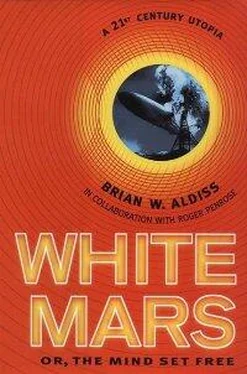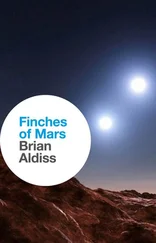Brian Aldiss - White Mars
Здесь есть возможность читать онлайн «Brian Aldiss - White Mars» весь текст электронной книги совершенно бесплатно (целиком полную версию без сокращений). В некоторых случаях можно слушать аудио, скачать через торрент в формате fb2 и присутствует краткое содержание. Год выпуска: 1999, ISBN: 1999, Издательство: Little, Brown UK, Жанр: Фантастика и фэнтези, на английском языке. Описание произведения, (предисловие) а так же отзывы посетителей доступны на портале библиотеки ЛибКат.
- Название:White Mars
- Автор:
- Издательство:Little, Brown UK
- Жанр:
- Год:1999
- ISBN:0-316-85243-0
- Рейтинг книги:5 / 5. Голосов: 1
-
Избранное:Добавить в избранное
- Отзывы:
-
Ваша оценка:
- 100
- 1
- 2
- 3
- 4
- 5
White Mars: краткое содержание, описание и аннотация
Предлагаем к чтению аннотацию, описание, краткое содержание или предисловие (зависит от того, что написал сам автор книги «White Mars»). Если вы не нашли необходимую информацию о книге — напишите в комментариях, мы постараемся отыскать её.
White Mars — читать онлайн бесплатно полную книгу (весь текст) целиком
Ниже представлен текст книги, разбитый по страницам. Система сохранения места последней прочитанной страницы, позволяет с удобством читать онлайн бесплатно книгу «White Mars», без необходимости каждый раз заново искать на чём Вы остановились. Поставьте закладку, и сможете в любой момент перейти на страницу, на которой закончили чтение.
Интервал:
Закладка:
This is not intended to be a record of my personal feelings. Yet I must admit here that I often thought about that fortunate girl who, Torn had told me, was the youthful Tom’s first lover. I could imagine everything about her.
Even while I practised my breathing exercises—even then, I found myself thinking of her. And of young Tom. And of the two of them, locked together with rain bathing their naked bodies.
This is not really a record of history. I never told anyone this before. But unexpectedly I started thinking that Tom Jefferies did not care for me at all. I felt so bad. I secretly thought I was beautiful and my body was lovely, even if he never noticed, even if no one noticed. Except Jon, who thought I was cute.
Kathi Skadmorr came over from the science unit with some discs of an old jazz man called Sydney Bechet and some laboratory-distilled alcohol. She was spending the night with her lover, Beau Stephens, and invited me to drink with them.
After some drinks, I asked Beau if he thought I was pretty.
“In an Oriental way,” he said.
I told him that was a stupid remark and meant nothing.
“Of course you’re pretty, darling,” said Kathi. Suddenly, she jumped up, put her arms round me, and kissed me on the mouth.
It went to my head like the drink. A track then playing was a number called “I Only Have Eyes For You”. I had never heard it before. It was good. I began to peel off my Nows and dance. Just for the fun of it. And my new leg looked fine and worked beautifully.
When I was down to my bra and panties it occurred to me not to go further. But the two of them were cheering and looking excited, so off they came. My breasts were so nice and firm—I was proud of them. I flung my clothes at Beau. What did he do? He caught my panties and buried his face in them. Kathi just laughed.
With the track ending, I suddenly felt ashamed. I had shown so much crotch. I ran into the bathroom and hid. Kathi came to soothe me down. I was crying. She sang softly, “I don’t know if we’re in a garden, Or in a crowded rendezvous.” And I felt awful next morning.
I never told anyone about this before.
“We must take the most tender care,” Tom said, when the Adminex was discussing education, “of our youngsters, so that they do not think of themselves negatively as exiles from earth. Education must mean equipping a child to live in wisdom and contentment—contentment with itself first of all. We need a new word for a new thing, a word that means awareness, understanding…”
“There’s the Chinese word juewu. It implies awareness, comprehension,” I suggested.
“Juewu, juewu…” He tried it on his tongue. “It has something of a jewel about it, whereas education smells of dusty classrooms. I can almost hear children going to their first playschool at the age of three, chirruping jewey-woo jewey-woo…”
The word was adopted by the group.
We then fell to discussing what activities those early chirrupers should engage in.
Sharon Singh was certain that young children most enjoyed music and verse with strong rhymes; rhythm, clapping, she said, was the beginning of counting, counting of mathematics, and mathematics of science.
Mary Fangold remarked that in the discussions in Plato’s Republic some time is spent wondering which metrical feet are best to express meanness or madness or evil, and which ones grace. The speakers conclude that music engenders a love of beauty.
I ventured to say that “beauty” had become a rather suspect, or at least a specialised, word.
Tom agreed that it had accumulated some embarrassments; yet we still understood that it had something to do with rightness and truth. It was hard to define except by parallels; certainly the right music at the right time was a benison. Better even than the art of speaking with grace, was employing a rich vocabulary—which was rarely the mark of an empty head.
And with the music had to go activity, dancing and such like. This was a way in which juewu helped to unite mind and body.
But we agreed that, while good teaching was important, it could be achieved only by good teachers. As yet no method had been established for guaranteeing good teachers, beyond the simple expedient of training and paying well, though not lavishly.
“But once the system is established,” Tom said, “then our well-taught children will make the best teachers. Patience, love and empathy are more valuable than knowledge.”
The next stage was the regularisation of educational curricula for various ages.
We wanted our first generation of Martian children to understand the unity and interconnectedness of all life on Earth.
We also wished them to understand themselves better than any generations had done before. Phylogeny was a required subject, for only from this could grow knowledge of one’s self.
Ambient and computer skills were already being taught, together with history, geophysiology, music, painting, world literature, mathematics. There would be personality sessions, wherein children could discuss any problems brewing; difficult situations could be dealt with swiftly and compassionately.
Tom appeared pleased with the work. Almost as an afterthought he suggested that the entire scheme should be shown to Belle Rivers, who had spoken on the subject of archetypes during our debates and was in charge of teaching cadre children.
Belle Rivers was slender and elegant, with a certain grandeur to her. She carried her head slightly to one side, as if listening to something the rest of us were unable to hear. She was about forty years old, perhaps more.
Tom opened the conversation by apologising for altering her curriculum. Altered circumstances demanded it. He said that he hoped the revised syllabus, a copy of which we had printed out, would please her.
Without responding, Rivers read through the syllabus. She set it down on a desk, saying, “I see you do not wish religion to be taught.”
“That is correct.”
“We have had to train our children for future careers. Nevertheless we always take care to include world religions in our curriculum. Do you not believe that God prevails as much on Mars as on Earth?”
“Or as little. We cannot leave it to any god to remedy in future those things he or she has failed to remedy in the past. We must attempt a remedy ourselves.”
“That’s rather arrogant, isn’t it?” She appeared less offended than contemptuous.
“I trust not. We are merely amused by ancient Greek tales of gods and goddesses interfering directly in the affairs of humanity. Such beliefs are outdated. We must try to laugh at any belief that imaginary, omnipotent gods will remedy our deficiencies. We must try to do such things for ourselves, if that is possible.”
“Oh? And if it proves impossible?”
“We do not know it will be impossible until we have tried, Belle.”
“That may be true. But why not enlist God in your enterprise? I seem to recall that the great Utopian, Sir Thomas More, made certain that the children of his Utopia were brought up in the faith and given full religious instruction.”
“The sixteenth century thought differently about such matters. More was a good man living in a circumscribed world. We must go by the advanced thought of our own time. All Utopias have their sell-by dates, you know.”
“And your Utopia has dropped any sense of the divine aspect of things.”
Tom offered a chair to Belle Rivers and invited her to be seated. His manner became apologetic. He said he realised that he had made a mistake in having Adminex draw up a new syllabus without consulting her in the first place. It must seem to her that he had usurped her powers, although that had been far from his intention. He had been too hasty; there was much still needing attention.
Читать дальшеИнтервал:
Закладка:
Похожие книги на «White Mars»
Представляем Вашему вниманию похожие книги на «White Mars» списком для выбора. Мы отобрали схожую по названию и смыслу литературу в надежде предоставить читателям больше вариантов отыскать новые, интересные, ещё непрочитанные произведения.
Обсуждение, отзывы о книге «White Mars» и просто собственные мнения читателей. Оставьте ваши комментарии, напишите, что Вы думаете о произведении, его смысле или главных героях. Укажите что конкретно понравилось, а что нет, и почему Вы так считаете.










